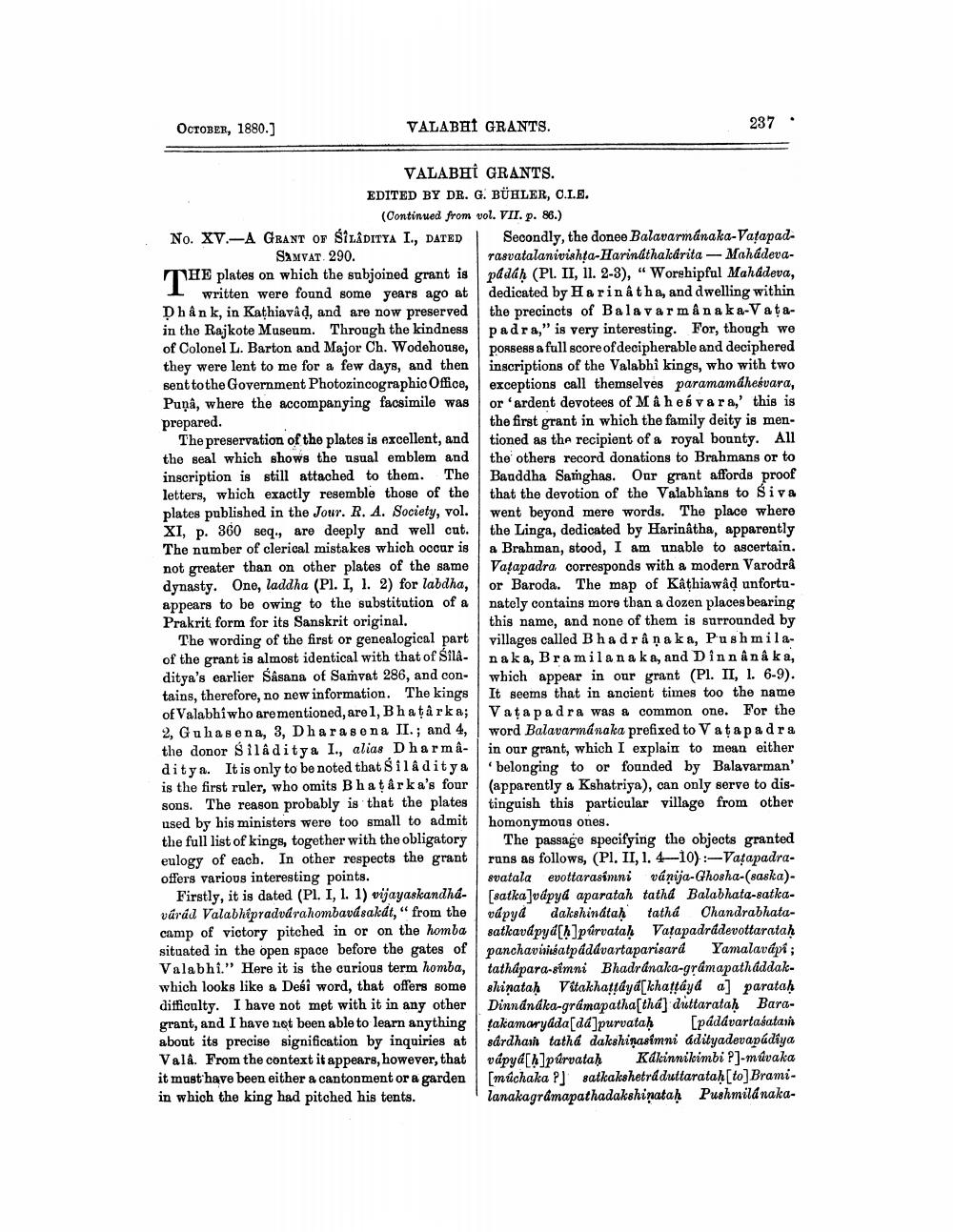________________
OCTOBER, 1880.]
VALABHI GRANTS.
VALABHI GRANTS. EDITED BY DR. G. BÜHLER, C.L.E. (Continued from vol. VII. p. 86.)
TH
No. XV.-A GRANT OF SILADITYA I., DATED SAMVAT. 290. THE plates on which the subjoined grant is written were found some years ago at Dhân k, in Kathiavâd, and are now preserved in the Rajkote Museum. Through the kindness of Colonel L. Barton and Major Ch. Wodehouse, they were lent to me for a few days, and then sent to the Government Photozincographic Office, Punâ, where the accompanying facsimile was prepared.
The preservation of the plates is excellent, and the seal which shows the usual emblem and inscription is still attached to them. The letters, which exactly resemble those of the plates published in the Jour. R. A. Society, vol. XI, p. 360 seq., are deeply and well cut. The number of clerical mistakes which occur is not greater than on other plates of the same dynasty. One, laddha (Pl. I, 1. 2) for labdha, appears to be owing to the substitution of a Prakrit form for its Sanskrit original.
The wording of the first or genealogical part of the grant is almost identical with that of Silâditya's earlier Sâsana of Samvat 286, and contains, therefore, no new information. The kings of Valabhi who are mentioned, are 1, Bhaṭarka; 2, Guhasena, 3, Dharasena II.; and 4, the donor Silâditya I., alias Dharmâditya. It is only to be noted that S i 1 âditya is the first ruler, who omits Bha târka's four sons. The reason probably is that the plates used by his ministers were too small to admit the full list of kings, together with the obligatory eulogy of each. In other respects the grant offers various interesting points.
Firstly, it is dated (Pl. I, 1. 1) vijayaskandhavárád Valabhipradvarahombavásakát," from the camp of victory pitched in or on the homba situated in the open space before the gates of Valabhi." Here it is the curious term homba, which looks like a Desi word, that offers some difficulty. I have not met with it in any other grant, and I have not been able to learn anything about its precise signification by inquiries at Vala. From the context it appears, however, that it must have been either a cantonment or a garden in which the king had pitched his tents.
237
Secondly, the donee Balavarmanaka-Vatapadrasvatalanivishta-Harinathakárita-Mahadevapádáḥ (PL. II, 11. 2-3), "Worshipful Mahadeva, dedicated by Harinâ tha, and dwelling within the precincts of Balavarmânaka-Vatapadra," is very interesting. For, though we possess a full score of decipherable and deciphered inscriptions of the Valabhi kings, who with two exceptions call themselves paramamáhesvara, or 'ardent devotees of M âhesvara,' this is the first grant in which the family deity is mentioned as the recipient of a royal bounty. All the others record donations to Brahmans or to Bauddha Samghas. Our grant affords proof that the devotion of the Valabhians to Śiva went beyond mere words. The place where the Linga, dedicated by Harinâtha, apparently a Brahman, stood, I am unable to ascertain. Vatapadra corresponds with a modern Varodrâ or Baroda. The map of Kathiawâd unfortunately contains more than a dozen places bearing this name, and none of them is surrounded by villages called Bha drânaka, Pushmilanaka, Bramilanaka, and Dinnânâka, which appear in our grant (Pl. II, 1. 6-9). It seems that in ancient times too the name Vatapadra was a common one. For the word Balavarmanaka prefixed to V atapadra in our grant, which I explain to mean either belonging to or founded by Balavarman' (apparently a Kshatriya), can only serve to distinguish this particular village from other homonymous ones.
The passage specifying the objects granted runs as follows, (Pl. II, 1. 4-10):-Vatapadrasvatala evottarasimni vánija-Ghosha-(saska)[satka]vápya aparatah tatha Balabhata-satkavapya dakshinátaḥ tatha Chandrabhatasatkavápyá[h]púrvataḥ Vatapadrádevottarataḥ panchavisatpádávartaparisará Yamalavápî; tathapara-simni Bhadranaka-gramapathaddakshinata Vilakkaṇyd[kkandyda] parata Dinnánaka-gramapatha[tha] duttaratah Baratakamaryáda[da]purvataḥ [pádévartala sárdham tatha dakshinasimni adityadevapúdiya vapyá[h]púrvataḥ Kákinnikimbi ?]-múvaka [múchaka ?] satkakshetraduttarataḥ[to] Bramilanakagramapathadakshinataḥ Pushmilánaka




